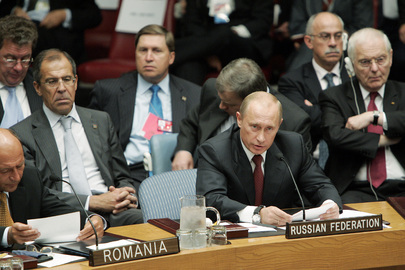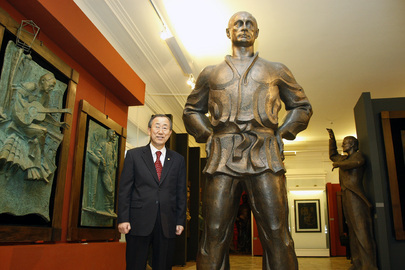The veto at the UN Security Council and traditional diplomacy may be a de facto get-out-of-jail card, even as international criminal justice gains definition in resolving conflicts between and within states. Slobodan Milosevic to Charles Taylor to Omar Bashar, the rule of law has translated into indictments. Potential prosecution freed Serbia and the region from Milosevic, and it was the catalyst for Colonel Gaddafi's demise in Libya. Of course, there are also clear indications that still not enough has changed. For example, Bashar al-Assad's cell door is still left open, presumably to entice him to flee Syria, in my view both a miscalculation and a betrayal of the country's and region's future. Vladimir Putin also perceives an environment more akin to his KGB misuse of legality rather than subject to impartial rule of law. To what degree, though, could Putin, or those acting upon his direction, be encouraged to consider the rule of law in their actions in Crimea and beyond and no longer be confident in their impunity?
Crime of Aggression?
Aggression is the most obvious criminal offense that would come to mind in a potential indictment. The foundation for such charge was most objectively presented before the UN Security Council by the Jordanian Ambassador Prince Zeid. Prince Zeid was also my colleague during the extensive deliberations at the Rome Conference establishing the ICC in 1998 and the follow-up drafting group on the Crime of Aggression. Unfortunately while many of us resisted, we were unable to ultimately wrest away, at least for now, the effective veto as it might apply to a charge of aggression as now incorporated in the Kampala Amendments which are now in the process of being ratified. (For more, read: Global Campaign for Ratification and Implementation of the Kampala Amendments on the Crime of Aggression)
Paramilitaries & Biker Gangs as Shock Troops:
However, Vladimir Putin and those under his effective control are not entirely off-the-hook. They, more accurately, their actions may be subject to prosecution for grave violations of international humanitarian law that relate to efforts to subdue opposition to their rule in Crimea and other areas of Ukraine that they may effectively control. This may be one reason why the Russian military is acting in Ukraine with some anonymity, without identifying insignia and the Kremlin will not admit to their presence (beyond those already authorized by Treaty primarily linked to the Black Sea Fleet). Employing paramilitaries as shock troops also appears to be part of the standard brew. In Crimea, a biker gang, the Night Wolves, purportedly personally favored by Putin appears already playing similar role as Arkan's Tigers in ex-Yugoslavia, or Rwanda or Syria or...
Crimea may now be Russian majority, but it is home to other Ukrainian citizens in particular a substantial Tartar minority. Russia dominion over Crimea largely occurred over the last two centuries (before it was part of the Ottoman Empire). The Tartars were persecuted, ethnically cleansed and sent into exile under Stalin resembling the Trail of Tears inflicted upon Native Americans under Andrew Jackson. Over the last couple of decades, Tartars made their way back to ancestral homes in Crimea in greater numbers. While dismayed by Ukrainian ultra-nationalists, they fear another ethnic cleansing under Putin's resurgent Russian Imperialism. The subjugation of Crimea is not likely to go easy, regardless of the diplomacy that may seek to understate the rule of law violations.
Does ICC Have Jurisdiction?
Evidence of grave violations of international humanitarian law may be limited for now but nonetheless may exist. Paramilitary and regular forces under effective Russian control are blocking access to observers from the UN and OSCE (Organization for Security and Cooperation in Europe to which both Russia and Ukraine are party). The would-be observers have been menaced and warning shots fired in their direction. Crimes have to be of a systematic nature that are covered by the Rome Statute and the ICC. In order for offenses to be actually prosecuted by the ICC, the national authority, in this case either Ukraine or Russia, has to be unwilling or unable to bring violations before its own judicial system. The actual perpetrators as well as those exercising effective command and control are subject to ICC jurisdiction. However, neither Russia or Ukraine, as yet, are party to the ICC. Ukraine and Russia are the exception as most European states have become parties, (including Bosnia & Herzegovina, Croatia, Serbia and all other states of former Yugoslavia currently also under authority of the first and precedent setting International Criminal Tribunal for the former Yugoslavia, ICTY). Among other states not parties: Iran, Israel, India, Pakistan, China, and the US.
Ukraine's new government is moving to indict its now former President Victor Yanukovych for crimes against humanity committed during the Euromaidan protests, and purportedly they also seek ICC prosecution. What is a bit puzzling for now is that Ukraine has not applied for ICC membership in full. The ICC may be Ukraine's best defense, as ineffectual as such may appear in face of overwhelming Russian military might. Sanctions in response to the Kremlin's violation of Ukrainian territorial integrity and sovereignty are likely to be more symbolic than altering the facts now being installed by Putin's forces. There will be no NATO military intervention. Washington, Brussels and UN diplomacy is likely to seek accommodation along with containment of a slightly expanded Russia.
The Narrative of Nationalist Adventures and Personality Cult Leadership:
The potential of ICC prosecution of Vladimir Putin, even if small, may be the most effective deterrent for further territorial ambitions including Central Asia, the Caucuses, as well as Europe. The justification that Putin is employing for the dismemberment of Ukraine, Russian-speaking minorities needing to live within Russia's borders to presumably attain security and safety, would be applicable from the Baltic states to Poland....Armenia, Azerbaijan....Kazakhstan, etc. Georgia is already suffering the consequences as well as Chechnya and other Republics within the Russian Federation that have faced harsh subjugation by the Kremlin. (Read "Ukraine's Fight is Europe's Battle")
The rule of law is about justice for past wrongs but even more about preventing future crimes. Milosevic sought to reassert an empire and lost a country as well as narrative. Despite presumably preventive diplomacy and containment from the West, he launched one campaign of domination after another -- Slovenia, Croatia, Bosnia, Kosovo... as means to perpetuate his rule via nationalist adventures. The similarities to Putin's current tactics, rationalization and response too are eerily similar. (Read: "Justice May be Slow, but It is Inevitable")
Milosevic ended before the ICTY, but by then he had also lost Kosovo and Montenegro. Imperial expansion had become the contrary. Perhaps this will be the consequence for Putin, and his personality cult rule will end in the heap of history, perhaps his own allies doing the dumping. Putin's excursion into Crimea probably will translate into the loss of influence over the rest of the Ukraine. Putin's ambition for a new Euro-Asian grouping dominated by Moscow may get lip-service from neighboring regimes, but they will seek to sleep in separate beds and ultimately bedrooms as they may have to accept the marriage in name but avoid the cohabitation with Putin's Russia.
As Putin now controls all traditional media, there are few outlets for impartial information or dissent within his own borders. Russia, though, is losing in terms of economic interests and influence as consequence of Putin's adventures, even as the personality cult and nationalist narrative dominates for now. However, how to dent this narrative and as critically deter other imperial ambitions of a Russian or any other global leader? The Rule of Law may lack both firepower and immediacy but it can define the narrative for the future.
UN PHOTO/Mark Garten: Vladimir Putin
UN PHOTO/Mark Garten: Secretary-General Poses with Statue of Putin in Moscow (17 March 2010)


